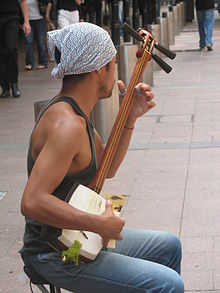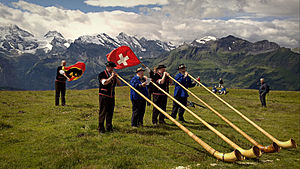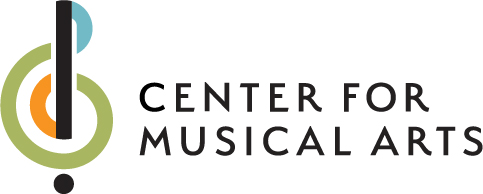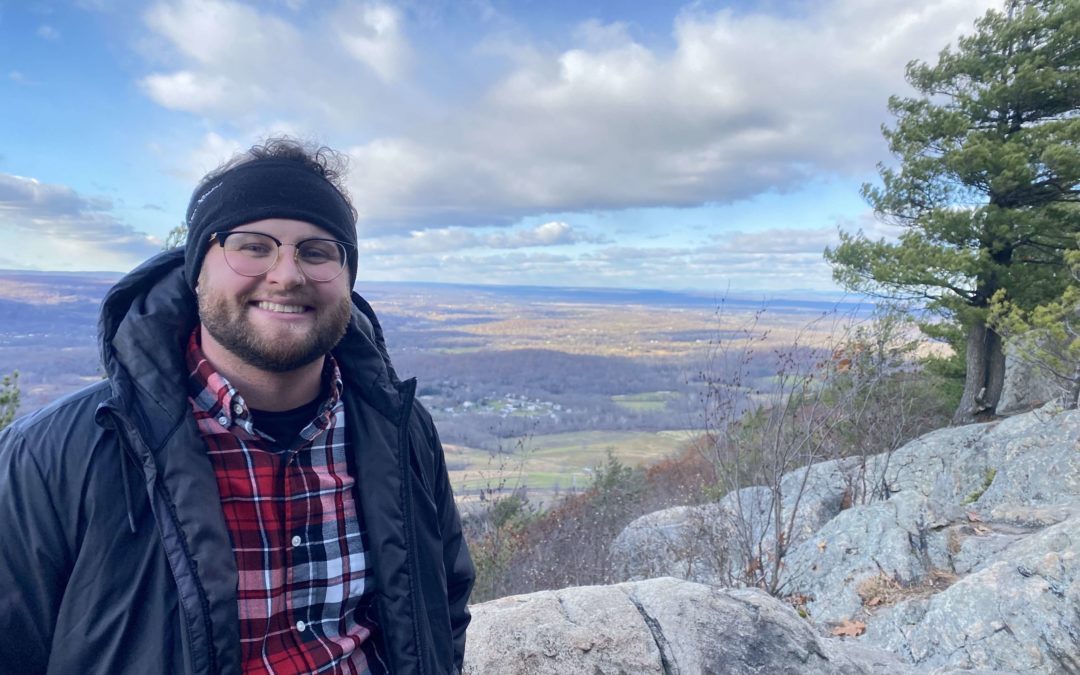The Center for Musical Arts has a variety of talented teachers. In this interview we spoke with trombone, ukulele, and world music instructor Jackson McLellan about the importance of curiosity and the delight in studying — and having fun with! — multiple instruments.
Center for Musical Arts: Good morning! I’m Erica Reid, I’m with the Center for Musical Arts, and I have the really fascinating job of interviewing our different faculty members to get to know them so that prospective students can know who they might be working with. Today I am talking to Jackson McLellan. How are you, Jackson?
Jackson: I’m good, thanks. How are you?
Center: Great! Can you just start off telling us your journey to how you came to the Center for Musical Arts?
Jackson: Sure. Yeah. So I was a multi-instrumentalist my whole life. We had a very musical family so lots of just messing around on different things. I eventually winded up going to Indiana University for my undergrad in trombone. I did a music education degree there and then came back to Colorado to do a Master’s in trombone performance pedagogy.
And then once I left the Master’s, I was sort of struggling to find a musical job that would feel fun and creative and eclectic. And so my partner and I were looking around for things and we wound up at [the Center for Musical Arts] and ran into an old family friend who happens to work at CMA. And we just started chatting and chatting and realized it would be a great place to work. So we joined on.
Center: And that was pretty recently. You’re a new faculty member with us.
Jackson: Yeah. That was over the summer.
En el centro: Bien.
Jackson: So this is my first year with CMA.
Center: Well, welcome aboard. So you mentioned being a multi-instrumentalist, and this is something I’m really interested to talk to you about, because you teach trombone, but you also teach ukulele, which I think of as a very different instrument. And then on your bio you mention that your instruments include, I’m quoting here, “modern and historical trombones, as well as guitar, ukulele, bass guitar, world percussion, tuba, analog synthesizer, and shamisen.” Can you tell me how you came to collect this diverse group of instruments, and which ones specifically you teach with the Center?
Jackson: Gotcha. That’s just a lifelong thing. Any time I found some new thing that could make a fun noise, I was instantly hooked. So that’s lifelong. Really what happened was I would play an instrument that I was very interested in and then someone would say, “Oh. We need someone to sit in on—”
Center: “—shamisen.” [laughs]
Jackson: Shamisen. Yeah. [laughs]
Center: Can you tell me really quickly what a shamisen is? I looked it up, but in case others don’t know, can you tell me a bit about that instrument?

A busker playing a shamisen, courtesy of Wikipedia
Jackson: Oh, sure. So it’s a lute, a plucked instrument from Japan that has a square body, about this big [gestures], covered in a skin head, sort of like a banjo. And then it’s got three big strings — the word “shamisen” means “three strings” in Japanese. And you have this pick that is about the size of a spatula that you hold in this very bizarre posture and sort of strike it backwards. And if you’ve ever heard Japanese folk music, the plucked thing you’re hearing is a shamisen.
[Listen to a shamisen performance]
Center: So this is what’s interesting to me because I think that — I do hear that somebody who considers themself primarily a percussionist picks up all these different percussion instruments, or someone who considers themselves primarily a string musician might play guitar and ukulele and a couple different instruments. But you’re got brass with strings and percussion. You’re really running the full gamut. Is that just how you’re wired?
Jackson: Yeah. Yeah. And it’s funny, these days I consider that to be an asset, being able to hop on all these different instruments and… the other day I was working in a marching band and the clarinet teacher was sick. So I hopped in and taught the clarinet section, because I’ve dabbled enough in clarinet to be able to — I’m not a great player, but I can help out students.
But for a long time, especially in the conservatory setting, you get this message that you have to specialize. And I think that’s true for most jobs that people are looking for. If someone wants an orchestral playing career, they want to go play for the New York Phil, then it makes more sense for them to play trombone and only trombone and only one type of trombone.
But I tried to specialize and I just couldn’t resist it. Anytime something new would crop up, I would just grab it.
Center: It takes all kinds!
Jackson: Exactly. Yeah.
Center: Okay. So let’s go back and talk about trombone and ukulele, which I understand are the instruments that you primarily teach at the Center, at least at this point in time. Tell me about your history with those instruments and about your lessons with those.
Jackson: Sure. So I’m a very roundabout trombone player. I played baritone in fifth grade and then a teacher said, “We need a tuba player,” so I became a tuba player. And then a teacher said, “We need someone to be a jazz trombone player,” so I hopped into the jazz bands and learned trombone. So it was very roundabout, but that’s my primary instrument. I’ve done recitals on that and when I do private teaching for high school and collegiate students, that’s what I’m doing.
And then ukulele is just kind of a lifelong interest of mine. My grandpa had a ukulele that I think was pretty instrumental in winning over my grandma—
Center: Pun intended? [laughs]
Jackson: Oh yeah, yeah. “Instrumental.” [laughs] I just got that. Yeah.
So we’ve always had ukuleles around the house. I’ve got my grandpa’s over there. It’s an old 1940s thing. And I just love the feel of it and the sound of it. Yeah, I’ve just always kept ukulele on as a hobby. So when CMA mentioned that they have some prospective ukulele students, it was a perfect match.
Center: And so I also see that you’re listed as teaching “world music” lessons and I’m not even sure what that looks like. Can you tell me a little bit about what it means to teach world music?
Jackson: Oh yeah. A lot of my students at CMA are at a pretty young age. And so a lot of what that means is exposure. So we’ll do instrument demo classes where we look at all the different instruments, including ones from Western classical music and music from all over the world. I’ll bring in fun percussion instruments and I’ve got a collection of odd flutes sitting around. I’ve got a flute from Peru, and an Irish penny whistle… and so at that age, it’s mostly about exposure.
En el centro: Sí.

One style of cajón (Peruvian box drum)
Jackson: Especially in a percussion sense. If a student can learn something in the realm of world percussion, playing something like the cajón, which it’s a Peruvian box drum, it’s this perfect segue into any other percussion. And so that’s another avenue.
Center: So tell me a little bit about your teaching philosophy. Your bio mentions that you value “musical curiosity as a central motivator for artistic discovery,” which does not surprise me having talked to you for five minutes. Tell me a little bit about how all of this sort of generalist approach and this love of all instruments and this love of all wide music, how does that affect your teaching and what is your philosophy?
Jackson: Oh sure. Well, like I said, I’ve never been able to do the steady track, and actually I’m neurodivergent in a couple of ways. And so part of that means I can’t approach something from the dogmatic path. For me to get an understanding, I have to get an understanding of the surrounding elements.
And that did so much for me in giving me a sense of musical aesthetics and really helping me in my playing career and if I’m teaching or conducting, that’s been so helpful. So I’ve grown to really value that and try to promote that in students. Just a sense of letting curiosity take you where you want to go and knowing that any musical info you pick up is going to be valuable at some point.
Even if it doesn’t let the student progress at 100% as fast as they could, they’re learning things they want to learn, they’re exploring, it feels like an adventure. We say “playing” music and I like it to feel like play.
Center: Do you work with students of all ages because we have talked a little bit about young students, but this seems like an approach that adults really need too. [laughs] We really need to learn — relearn — how to play and be curious and give up control a little bit. What is the range of students you work with?
Jackson: So my current course load at CMA is pretty young. I’ve got students from about four to eight. So the really young set.
Center: Oh my gosh.
Jackson: Yeah. Which is adorable. And it threw me for a loop. I did a lot of my training as a secondary teacher and that’s why I did my student teaching and my experience is mostly with grades nine to 12. So this has been a hugely fun and challenging experience trying to adapt that to younger students.
But you’re right. Any age student can benefit from a curious approach. And I think adults give themselves such little latitude and grace to be able to have fun and make a potentially bad sound and just be okay with exploring music. So I find when I do have adult students — in my freelance career or just working one-on-one with students — I need to really push the adults to be curious and to be casual and to laugh during the lessons and find some sense of play.
And it’s one of the reasons … oh, I’m sorry—
Center: You go right ahead!
Jackson: Okay. It’s one of the reasons I prefer teaching ukulele over guitar for a beginner. If someone is dead set on guitar, then I’ll certainly teach guitar — and I have — but the barriers to success on guitar are big, just physically.
And so I found that if I can get, especially an adult, if I can get a ukulele into their hands, they are ready to play with it because it seems like a casual, inviting instrument, whereas the guitar can feel intimidating.
Center: And to your point, even if you are a guitar student, maybe the ukulele is a way to augment your guitar studies in a way that is more playful, and you can practice for longer without those barriers that you’re mentioning. So maybe there’s a way to do both even if that still is your interest.
Jackson: Oh, absolutely. Yeah. I’m a huge advocate of doing different instruments at the same time, and exploring them.
And I think there’s also a myth that ukulele is — even though it is such a fun, inviting instrument, it kind of has this myth of being a toy. But actually it’s very close to being what the guitar was for most of its history. This big behemoth of a guitar we have these days is new! This six string giant instrument, that’s a Romantic product, but the guitar for most of its history was a little thing with a few strings like a ukulele.
So I think if I have a student who’s very interested in guitar, then obviously we do guitar, but playing around with a ukulele could open up new avenues to them in a really fun way.
Center: I love this. I’ve been reading a lot about creativity in children. I’m a writer myself, and so — as a writer, we’re always trying to do the same thing, sort of unlock the creativity we used to have as children because it’s natural to a certain age. I was just reading an interview that was saying around 12 or 13 that ego starts to come in, and what have you.
And anyway, I just think this is just a wonderful approach for students of all age and at the Center, we talk about “music for all, for life” and I think to me that means if you have been curious about music for all your life, but you don’t know where to start, it can be intimidating to say, “This is my one instrument and I’m going to study it fiercely and diligently.”
And I think that what you’re offering is another approach. There are many approaches for many people, all of them valid. This is a different approach where I think it sounds a little, I don’t know, a little more exploratory, potentially.
If you don’t know what instrument you want to really focus on yet or if you’re not, to your point, going the conservatory track and you don’t need to specialize in that, that at any age you’re welcome to jump in. And even if you have a history with the piano and you want to pick up the tuba, you’re welcome to do that and to try that.
And not only is it never too late to pick up those piano lessons again, it’s also never too late to see what else might be out there and augment the music you already have in your life in a new way. That’s kind of what I’m hearing from you, through my own lens.
Jackson: Oh, that’s beautifully summed up. Yeah. I completely agree.
Center: So what are you doing outside of music and teaching?
Jackson: I do lots of little hobbies.
Center: I’m not shocked. [laughs]
Jackson: Right? [laughs] My partner and I talk a lot about — we like very hobbit lifestyles. So we do lots of hiking around and traveling around Colorado. She’s a New Jersey transplant and so a lot of these sites are new to her. So we’ve just been doing the rounds of fun Colorado things.
But yeah. I do lots of cooking and baking. We crochet a lot. We make coffee. I brew a huge number of things. So beer and soda and kombucha and just kind of anything that has a little critter in there making something—
Center: What a way to put it. [laughs]
Jackson: Yeah. We call them the yeasty boys. [laughs] And so you might hear in the corner there’s some bubbling because we always have a keg of something or other, some cool kombucha, tea, something.
Center: You’re a maker at heart.
Jackson: Yes. Yeah. You gotta tinker.
Center: Fantastic. Well it has just been a joy talking with you. Is there anything else that we haven’t covered, that I haven’t asked you, that you think would be important to know to prospective students of any instrument, including, again, trombone and ukulele are the main instruments you’re teaching, but sounds like there are potential for other things.
Anything that they should know about you, how you teach, your role at the Center, anything like that? How to get started?
Jackson: Yeah. I would just come in and chat and please come with your wildest ideas because that’s the best way that I find things. I would never play the shamisen if a teacher didn’t say, “We need someone to help out with the Japanese folklore ensemble.” I love that kind of stuff.

Alphorns, which Jackson can help you play
If you want to play the alphorn, the big wooden thing from the Ricola commercials, come in. We’ll work it out. If you want to play slide trumpet, I’ve got one. We’ll work it out. Come in with any pipe dream and I’m the one to help you figure out how to make it happen.
Center: “Come in with any pipe dream and I’m the one to help you figure out how to make it happen.” I love it. Thank you so much for your time today, Jackson. I really appreciate it.
Jackson: Thanks so much.

